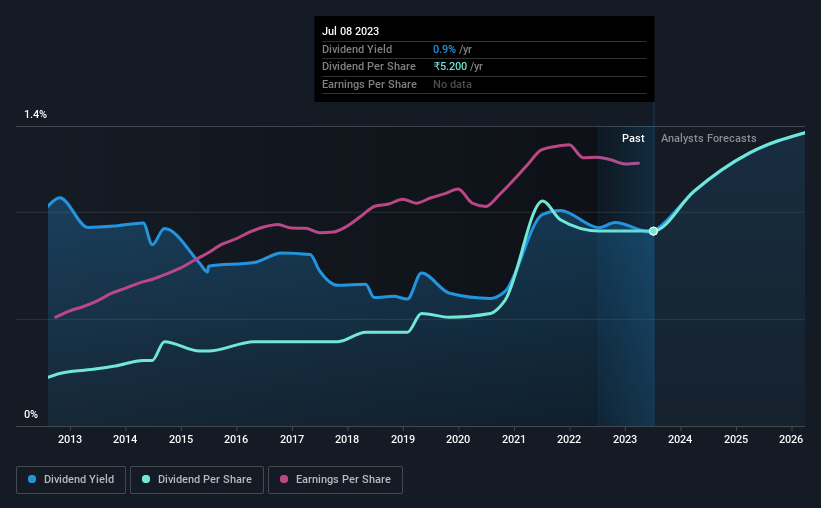
Dabur India Limited (NSE:DABUR) will pay a dividend of ₹2.70 on the 9th of September. The dividend yield is 0.9% based on this payment, which is a little bit low compared to the other companies in the industry.
See our latest analysis for Dabur India
Dabur India's Earnings Easily Cover The Distributions
It would be nice for the yield to be higher, but we should also check if higher levels of dividend payment would be sustainable. Prior to this announcement, Dabur India was quite comfortably covering its dividend with earnings and it was paying more than 75% of its free cash flow to shareholders. By paying out so much of its cash flows, this could indicate that the company has limited opportunities for investment and growth.
The next year is set to see EPS grow by 60.7%. Assuming the dividend continues along recent trends, we think the payout ratio could be 38% by next year, which is in a pretty sustainable range.

Dividend Volatility
The company has a long dividend track record, but it doesn't look great with cuts in the past. Since 2013, the dividend has gone from ₹1.30 total annually to ₹5.20. This implies that the company grew its distributions at a yearly rate of about 15% over that duration. Dabur India has grown distributions at a rapid rate despite cutting the dividend at least once in the past. Companies that cut once often cut again, so we would be cautious about buying this stock solely for the dividend income.
Dividend Growth May Be Hard To Achieve
Given that the dividend has been cut in the past, we need to check if earnings are growing and if that might lead to stronger dividends in the future. Earnings have grown at around 4.6% a year for the past five years, which isn't massive but still better than seeing them shrink. The company has been growing at a pretty soft 4.6% per annum, and is paying out quite a lot of its earnings to shareholders. This could mean the dividend doesn't have the growth potential we look for going into the future.
In Summary
Overall, it's nice to see a consistent dividend payment, but we think that longer term, the current level of payment might be unsustainable. The company hasn't been paying a very consistent dividend over time, despite only paying out a small portion of earnings. Overall, we don't think this company has the makings of a good income stock.
Market movements attest to how highly valued a consistent dividend policy is compared to one which is more unpredictable. At the same time, there are other factors our readers should be conscious of before pouring capital into a stock. For instance, we've picked out 1 warning sign for Dabur India that investors should take into consideration. If you are a dividend investor, you might also want to look at our curated list of high yield dividend stocks.
New: Manage All Your Stock Portfolios in One Place
We've created the ultimate portfolio companion for stock investors, and it's free.
• Connect an unlimited number of Portfolios and see your total in one currency
• Be alerted to new Warning Signs or Risks via email or mobile
• Track the Fair Value of your stocks
Have feedback on this article? Concerned about the content? Get in touch with us directly. Alternatively, email editorial-team (at) simplywallst.com.
This article by Simply Wall St is general in nature. We provide commentary based on historical data and analyst forecasts only using an unbiased methodology and our articles are not intended to be financial advice. It does not constitute a recommendation to buy or sell any stock, and does not take account of your objectives, or your financial situation. We aim to bring you long-term focused analysis driven by fundamental data. Note that our analysis may not factor in the latest price-sensitive company announcements or qualitative material. Simply Wall St has no position in any stocks mentioned.
About NSEI:DABUR
Excellent balance sheet average dividend payer.

